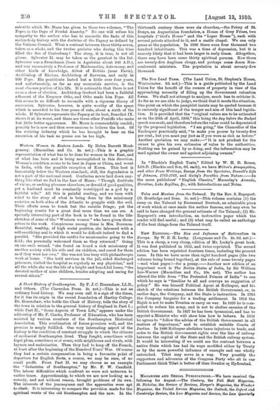Western Women in Eastern Lands. By Helen Barrett Mont- gotuery.
(Macmillan and Co. 28. net.)—This is a graphic representation of what has to be done for women in the East, and of what has been and is being accomplished in this direction. Woman's condition seems to be best in Japan or China, and worst in India, with the possible exception of Korea. This best is lamentably below the Western standard; still, the degradation is not a part of the national creed. Confucius never laid down any- thing like what we find in the Law of Mann: "Though destitute of virtue, or seeking pleasure elsewhere, or devoid of good qualities, yet a husband must be constantly worshipped as a god by a faithful wife." All this is painful reading, and we turn with relief to the story of what is being done by the missionary societies on both sides of the Atlantic to grapple with the evil. Their efforts seem to touch but the outside fringe; yet the beginning counts for a great deal more than we can see. I specially interesting part of the book is to be found in the life- sketches of some of tho "Western women" who have given them- selves to the work. Conspicuous among these is Mrs. Doremus.
• Beautiful, wealthy, of high social position, she laboured with a self-sacrificing zeal to which it would be difficult indeed to find a "She provided the outfits for missionaries going to the field ; she personally welcomed them as they returned." Going on one such errand, "she found on board a sick missionary of another society with his wife and six children, and cared for them as if they were her own." She was not less busy with philanthropic work at home. "She held services in the jail, aided discharged
• prisoners, visited the hospital as regularly as any physician," and all the while she was the life of a bright and beantlful home, "the devoted mother of nine children, besides adopting and caring for several others."






































 Previous page
Previous page